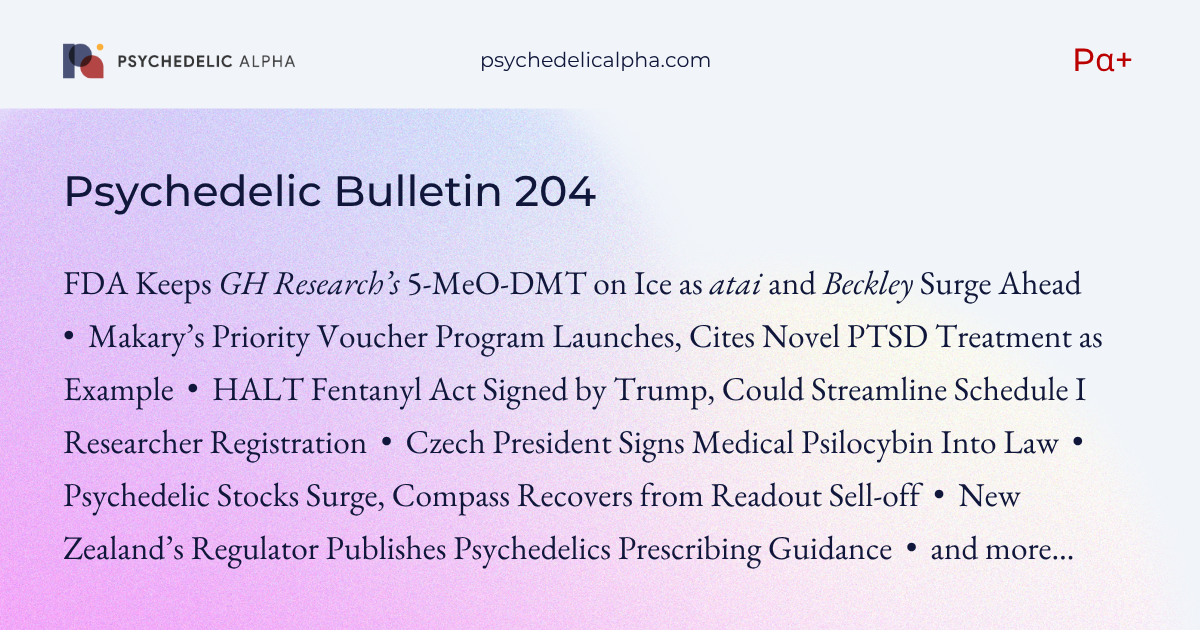In this Issue
- FDA Keeps GH Research’s 5-MeO-DMT on Ice as atai and Beckley Surge Ahead
- Makary’s Priority Voucher Program Launches, Cites Novel PTSD Treatment as Example
- HALT Fentanyl Act Signed by Trump, Could Streamline Schedule I Researcher Registration for Some
- FDA AdComm Skewers PTSD Drug Combo
- Czech President Signs Medical Psilocybin Into Law
- Psychedelic Stocks Surge, Compass Recovers from Readout Sell-off
- New Zealand’s Medicines Regulator Publishes Guidance for Practitioners Applying to Prescribe Psychedelics
- Psilocybin for Stroke Study Launches at Hopkins
- Spravato Sales Continue to Increase
- and more…
***
FDA Keeps GH Research’s 5-MeO-DMT on Ice as atai and Beckley Surge Ahead
On Wednesday, GH Research announced that FDA is retaining a clinical hold on its Investigational New Drug (IND) application to commence a trial of its inhaled 5-MeO-DMT candidate (GH001) for treatment-resistant depression (TRD) in the U.S.
That hold was first revealed nearly two years ago, in September 2023. Last month, the company announced that it had submitted a complete response to the hold.
According to 21 CFR § 312.42(e), FDA has thirty calendar days to review complete responses to IND holds and make a decision on whether it adequately addresses the issues raised and thus may proceed.
Given GH’s June 20th response submission announcement, the latest possible date that the agency’s response could have been received, at least assuming it was to meet its target, was July 20th. When that day passed with not a peep from the company, its stock dropped around 15%.
Then, on Wednesday morning, the company shared that the hold remains in place.
GH said that there is “only one hold topic remaining”, which it says is related to respiratory tract histology findings in rats. “The FDA requested that we either provide additional data or further justification” on that front, it said in its press release.
“We strongly believe, based on scientific evidence, that the respiratory tract histology findings are rat specific”, it continued.
(In February, the company shared that an additional inhalation toxicology study in rats “showed histology findings consistent with our previously completed study in rats.” “This supports our position that these findings are rat specific”, it added.)
It said that there are “no additional requests related to dog toxicology” (referring to the FDA-requested non-rodent inhalation toxicology study that FDA requested in its original clinical hold), and that there “are no device related issues remaining.” Readers will recall that the company is attempting to bridge from an off-the-shelf vaporiser (the Volcano) to its own proprietary device.
According to a new presentation from the company (PDF), its plan of action is to “[b]olster rat specificity response with additional expert opinion, available data and arguments”. Might that imply that the company is not prepared to perform further preclinical work, which would set its U.S. Phase 3 trial launch back substantially?
It is not unheard of for rat studies to flag things that are not identified in non-rodent animals, given that they can be more sensitive in some regards. Still, that sensitivity could reveal risks that might arise from chronic exposure in non-rodent animals, or in more sensitive individuals.
What might GH do if it cannot convince the agency that its findings are rat-specific, or that additional data need not be collected?
Well, in the company’s latest materials, it appears to be positioning its IV formulation of 5-MeO-DMT hydrobromide (GH002) as a back-up, if it can’t convince FDA to press play on its lead, inhaled, candidate (GH001).
This week, the company reiterated that topline results from its Phase 1 of that IV candidate in healthy volunteers report that it was well-tolerated, with no severe or serious adverse events. They also said it produced “ultra-rapid psychoactive effects” and that its pharmacokinetic profile “was equivalent to that of GH001.”
The company further shared that it aims to submit an IND for GH002 in Q4.
What’s more, a slide (17) in that new presentation (PDF) emphasises that both candidates, inhaled and IV, are “Fast-in-Fast-Out”, “patent protected”, and have “Comparative PK equivalence”. At the foot of that slide, the company writes in bold: “Ongoing Pivotal Program preparation activities currently synergistic across GH001 and GH002 programs”, again appearing to confirm that GH002 is a hedge.
Presumably hoping to put a more positive sheen on the announcement, GH also announced topline data from the open-label extension portion of its Phase 2b trial of inhaled 5-MeO-DMT (GH0010) in treatment-resistant depression (TRD)…
Sign-in or join Pα+ to continue reading this Issue of the Psychedelic Bulletin…
Join Pα+ Today
Independent data-driven reporting, analysis and commentary on the psychedelics space: from business and drug development through to policy reform and culture.
Already a member? Log In
✓ Regular Bulletins covering key topics and trends in the psychedelics space
✓ Regular articles and deep dives across psychedelic research, policy and business
✓ Interviews with insiders
✓ Monthly interactive database and commentary on psychedelic patents
✓ Quick-take analysis of major developments
✓ A Library of primers and explainers
✓ Access to our full back catalogue


